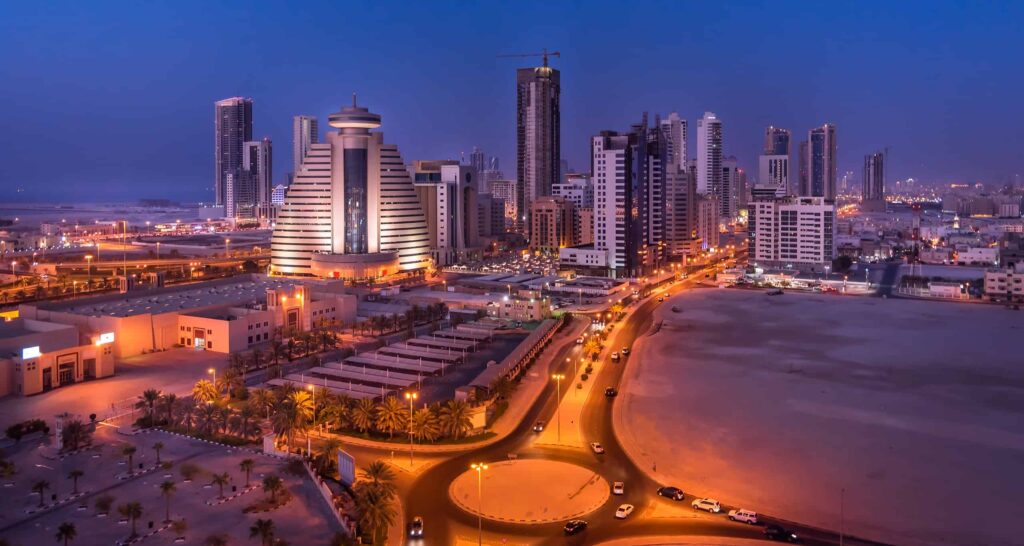Bahrain has big development plans and investors are interested. But its geographical location is both a blessing and a curse.
Bahrain was once considered the leading financial center of the six-nation Gulf Cooperation Council (GCC). Since then, Dubai has taken on the title, and other jurisdictions in the region, including Abu Dhabi, Qatar and most recently Saudi Arabia, have taken the initiative to become financial centers.
Questions about Bahrain’s dependence on hydrocarbon revenues, the pace of economic diversification, debt levels and its place in the Gulf’s geopolitical matrix continue to plague the island kingdom’s ambitions.
However, earlier this year, Bahrain was ranked first in the world for Islamic finance regulation in the ICD-LSEG Islamic Finance Development Report. Efforts to attract foreign direct investment are also progressing. In 2022, the latest period for which data is available, FDI inflows reached $2.76 billion, up 55.2% from the previous year, according to the Bahrain Economic Development Board.
Maintaining institutional trust is a priority for policymakers. In February, the Bahraini government tapped bond markets to meet looming debt payments, issuing seven-year sukuk – a sharia-compliant Islamic financial instrument – and 12-year conventional bonds, each worth about $1 billion, taking advantage of US Treasury depreciation. yields and tighter spreads.
Investors have bought into Bahrain’s story, at least for now, says Frank Bekaert, emerging markets analyst at Gimme Credit. “Bahrain bond spreads are already very tight and there are still geopolitical tensions in the Middle East,” he notes.
Bahrain’s budget deficit was only about 2.5% of GDP last year, but the gap is expected to widen this year, London-based Capital Economics warned in a February report. The principal amount of about $2 billion of the Eurobonds matures in 2024, with a more onerous repayment schedule looming in subsequent years. At its peak, Bahrain’s debt to GDP ratio was 100.5%. Although this figure has since fallen to 89%, it remains a heavy burden.
Implicit in maintaining investor confidence is the kingdom’s ability to seek financial support from other Gulf states, particularly neighboring Saudi Arabia, suggesting the risk of sovereign default remains low, Capital Economics said. Some analysts are hopeful that Bahrain will continue to liberalize its economy and finally cement its position as a key Gulf economy, but the emerging consensus is that further reforms are needed.
It’s still about oil
Despite the fact that Bahrain is not a member of OPEC+, it continues the cartel’s policy. Oil accounts for more than 70% of Bahrain’s government revenues, and planned production cuts will weigh on the country’s growth prospects this year, including in the non-oil sector, according to the US Commerce Department. Despite this, with GDP forecast to grow by around 3% year-on-year, Bahrain is tied with the United Arab Emirates (UAE) for having the strongest growth prospects in the Gulf, according to Capital Economics.
Oil’s existentially important contribution to Bahrain’s economy is at the heart of the government’s plans to double investment. While the UAE recently hosted the COP28 conference, which highlighted global concerns about the impact of fossil fuels on the climate, Bahrain, backed by the US, is seeking to dramatically expand oil and gas production.
The US Export-Import Bank is backing Bahrain’s proposals to drill more than 450 new oil and gas wells as part of a $4.2 billion program to boost production following the discovery of new reserves in 2018. Oil and gas pumping from the expanded field is projected to increase and release more than 1.4 million tons of CO2 per year by 2026, double 2022 levels.
Nascent efforts to diversify the economy have produced mixed results, leaving the kingdom with no choice but to increase capacity. However, the government remains mindful of its environmental responsibilities, says Ujjwal Deb, vice president of energy and commodities at Publicis Sapient. “They need to produce more oil and increase their refining capacity by two-thirds,” he estimates, “which they plan to do in combination with carbon capture technology to miss their 2060 net-zero carbon targets.”
Role of the private sector
Nevertheless, Bahrain remains attractive to investors. In 2022, manufacturing accounted for 17% of FDI. And in January, Conexus Resources Group, a British metals and agricultural products company, opened a $100 million, 32,000-tonne aluminum smelter.
The government is also hopeful that early adoption of cloud technology, which saw Bahrain adopt a national “cloud first” policy in 2017, will pay dividends over the next few years. A report by the International Data Corporation predicts that cloud spending will contribute more than $1.2 billion to the kingdom’s GDP by 2026, roughly equivalent to 23% of total GDP. Already in 2019, Amazon Web Services selected Bahrain to host the first AWS Region in the Middle East and North Africa. Chinese company Huawei also has its Middle East and Central Asia headquarters on the island.

Advisors: Centralized decision making
may affect the support of public finances and
the economic growth.
Meanwhile, Bahraini companies are accelerating plans to increase offshore investment. Investcorp, a Bahrain-headquartered alternative asset manager, is raising between 2 billion and 4 billion yuan (about $274 million to $548 million) for its first-ever Chinese currency private equity fund. In November, Investcorp’s CEO said the firm intended to apply for a license from Chinese authorities to begin raising funds from domestic institutions.
Ambitions to develop the economy prioritize the development of non-oil sectors such as tourism, financial services, manufacturing, transport and logistics. Together with plans to promote innovation and entrepreneurship, they form the basis of Bahrain’s venture capital ecosystem. Mumtalakat, the kingdom’s sovereign wealth fund with assets of about $18 billion, is leading these efforts, investing in companies and sectors that align with the government’s diversification goals, said Michael Ashley Shulman, partner and chief information officer at Running Point Capital Advisors.
Bahrain is also keen to take advantage of growing trade flows between the Middle East and China. Tourism looks set to get a boost following the announcement of direct flights between Bahrain, Guangzhou and Shanghai. And Gulf countries are hoping to reach a free trade agreement with China, potentially expanding bilateral trade. In addition to China’s huge demand for oil, Beijing has highlighted the GCC’s attractiveness for inclusion in President Xi Jinping’s Belt and Road Initiative.
What do investors want?
Despite limited results so far, Bahrain is betting big on diversifying its economy. The government is now pursuing a multi-year economic plan that aims to attract more than $30 billion in strategic investment to boost non-oil growth, said Shulman, who expects a bias toward investment rather than direct government aid, which is hampered by debt obligations.
The Fiscal Balance Program (FBP), designed to reduce government spending and achieve fiscal balance, has “strengthened fiscal policymaking, although fiscal flexibility remains limited due to high debt levels and dependence on oil revenues,” Shulman says.
The updated FBP includes a statement of support from Bahrain’s Gulf partners, who note that the GCC Development Fund will continue to implement capital expenditure projects in Bahrain, Fitch Ratings said in August. Despite this, Shulman argues that the government will have to reduce the levels of bureaucracy inherent in a government appointed by the king in order to achieve its goals.
“Centralized decision-making can make a difference in supporting sustainable public finances and balanced economic growth,” he says.
It is equally important to simplify rules and procedures to create a dynamic business environment that attracts and retains international companies, says Yusuf Mansawala, chief market analyst at CPT Markets. But Bahrain must also improve the skills of its workforce.
“Investment in human capital development is necessary to equip citizens with the knowledge needed to compete in the global marketplace,” says Mansawala.
Region on the brink
Bahrain’s location at a strategic crossroads is both a blessing and a curse for its investment and development aspirations. China’s interest in the Gulf region is quasi-political, including the need to continue oil supplies. The Strait of Hormuz is a vital channel for Bahrain’s oil exports, but recent rising tensions resulting from the conflict between Israel and Hamas and Houthi attacks on shipping have brought the region to the brink. In 2020, Bahrain and the UAE were the only Gulf members to agree to normalize relations with Israel under the so-called Abraham Accords.
Last year, Israel opened an embassy in Manama. But unlike the UAE, Bahrain has received little economic benefit from the rapprochement. As home to the US Fifth Fleet, a defensive bulwark against Iran’s regional ambitions, Bahrain walks a political tightrope.
The kingdom also needs to convince investors of its long-term viability. Despite the fact that the country managed to avoid major unrest, protests against Israel’s policies in the Gaza Strip spilled into the streets. Before the latest conflict, the World Bank gave Bahrain only a 30.66 percentile ranking for political stability in its 2022 World Governance Indicators (100 points being the highest ranking).


